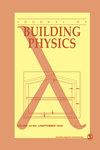Multi-step solar radiation prediction using transformer: A case study from solar radiation data in Tokyo
IF 1.4
4区 工程技术
Q3 CONSTRUCTION & BUILDING TECHNOLOGY
引用次数: 0
Abstract
The widespread advancement of computer technology resulted in the increasing usage of deep learning models for predicting solar radiation. Numerous studies have been conducted to explore their research potential. Nevertheless, the application of deep learning models in optimizing building energy systems, particularly in a multi-step solar radiation prediction model for model predictive control (MPC), remains a challenging task. This is mainly due to the intricacy of the time series and the possibility of accumulating errors in multistep forecasts. In this study, we propose the development of a transformer-based attention model for predicting multi-step solar irradiation at least 24 h in advance. The model is trained and tested using measured solar irradiation data and temperature forecast data obtained from the Tokyo Meteorological Agency. The findings indicate that the transformer model has the capability to effectively mitigate the issue of error accumulation. Additionally, the generative model exhibits a significant improvement in accuracy, with a 62.35% increase when compared to the conventional regression LSTM model. Additionally, the transformer model has been shown to attain superior prediction stability, mitigate the effects of error accumulation in multi-step forecasting, and circumvent training challenges stemming from gradient propagation issues that can occur with recurrent neural networks.利用变压器进行多级太阳辐射预测:东京太阳辐射数据案例研究
随着计算机技术的广泛发展,越来越多地使用深度学习模型来预测太阳辐射。为探索其研究潜力,已经开展了大量研究。然而,将深度学习模型应用于优化建筑能源系统,特别是用于模型预测控制(MPC)的多步骤太阳辐射预测模型,仍然是一项具有挑战性的任务。这主要是由于时间序列的复杂性和多步骤预测中误差累积的可能性。在本研究中,我们提出开发一种基于变压器的注意力模型,用于至少提前 24 小时预测多步骤太阳辐照度。利用从东京气象厅获得的实测太阳辐照数据和温度预报数据,对模型进行了训练和测试。研究结果表明,转换模型能够有效缓解误差累积问题。此外,与传统的回归 LSTM 模型相比,生成模型的准确性有了显著提高,提高了 62.35%。此外,变压器模型还具有出色的预测稳定性,能减轻多步预测中误差累积的影响,并能规避递归神经网络可能出现的梯度传播问题所带来的训练挑战。
本文章由计算机程序翻译,如有差异,请以英文原文为准。
求助全文
约1分钟内获得全文
求助全文
来源期刊

Journal of Building Physics
工程技术-结构与建筑技术
CiteScore
5.10
自引率
15.00%
发文量
10
审稿时长
5.3 months
期刊介绍:
Journal of Building Physics (J. Bldg. Phys) is an international, peer-reviewed journal that publishes a high quality research and state of the art “integrated” papers to promote scientifically thorough advancement of all the areas of non-structural performance of a building and particularly in heat, air, moisture transfer.
 求助内容:
求助内容: 应助结果提醒方式:
应助结果提醒方式:


